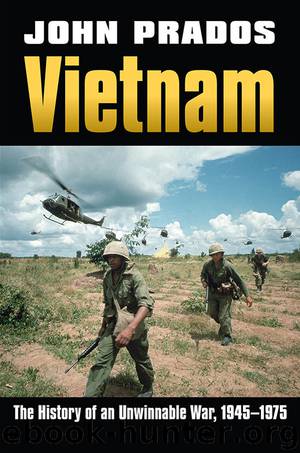Vietnam by Prados John

Author:Prados, John
Language: eng
Format: epub
ISBN: 9780700623631
Publisher: University Press of Kansas
Published: 2016-11-10T05:00:00+00:00
Salted Peanuts
Among those who guided the powers during these fateful days, there was one who wanted to avoid the inevitable. For months Henry A. Kissinger fought a rearguard battle against a pullout. This began with the disappearance of unilateral withdrawal from the Nixon administration’s policy review, but it did not end there. Kissinger muddied the meaning of terms, mixing one-sided with mutual withdrawal concepts, and argued against “deescalation”—a code word for withdrawal—in a long series of memoranda. The position complemented Kissinger’s search for ways to carry out the Madman strategy.
On March 8, 1969, with Defense Secretary Melvin Laird in Saigon actually assembling a framework plan for U.S. withdrawal, Kissinger sent Nixon a memorandum purporting to consider de-escalation in the light of overall U.S. strategy. “If we now de-escalate,” the national security adviser wrote, “Hanoi will get for nothing what it has had to pay heavy, perhaps excessive casualties to obtain.” Dr. Kissinger warned that officials would tell Nixon the United States could always resume military operations, but “every difficulty we have had in deciding whether the bombing halt ‘understanding’ had been violated will be compounded in the case of de-escalation.” Kissinger concluded, “we should not agree to de-escalate now—all the more so if you plan to withdraw some forces in a few months.”45
Kissinger’s argument might be considered a short-term objection, particularly given its reference to an intention to actually begin withdrawals, except that virtually every time the issue arose, no matter the context, he offered similar counsel. When setting the U.S. negotiating position for the Paris talks, Kissinger wanted to make a U.S. withdrawal conditional on a North Vietnamese one. He noted, “It is hard to visualize concrete deescalatory proposals that would be truly reciprocal. Most suggestions would seem to favor the enemy militarily.” Kissinger wanted detailed studies of unilateral possibilities, “in part to make clear the great difficulty of developing any concrete proposals.”46 At the March 28 NSC meeting that considered a negotiating strategy, Nixon called on his security adviser to cover de-escalation. There were two problems, Henry said: the game plan and mutual withdrawal. Kissinger noted a major disagreement over whether to de-escalate, and a contingent one whether negotiations should include withdrawal. Nixon clarified: de-escalation did not mean unilateral U.S. withdrawal. He simultaneously ruled out any reduction in the means of warfare such as Arc Light strikes.47 If unilateral measures were ruled out, along with both forces and capabilities, there could be no de-escalation except through a peace agreement.
This same muddle applied to mutual withdrawal. Washington knew that Thieu, to the extent he was willing to countenance U.S. withdrawal at all, wanted a large residual force left in South Vietnam. But all the schemes that would be offered were predicated on a complete DRV withdrawal. Thus Nixon bucked for trading a partial U.S. withdrawal for the adversary’s total one. Hanoi was not going to accept that, as was recognized at the time. Dr. Kissinger made this explicit. At the NSC meeting he said, “The alternatives are, should we
Download
This site does not store any files on its server. We only index and link to content provided by other sites. Please contact the content providers to delete copyright contents if any and email us, we'll remove relevant links or contents immediately.
| Africa | Americas |
| Arctic & Antarctica | Asia |
| Australia & Oceania | Europe |
| Middle East | Russia |
| United States | World |
| Ancient Civilizations | Military |
| Historical Study & Educational Resources |
The Radium Girls by Kate Moore(12028)
100 Deadly Skills by Clint Emerson(4925)
Rise and Kill First by Ronen Bergman(4789)
The Templars by Dan Jones(4689)
The Doomsday Machine by Daniel Ellsberg(4490)
The Rape of Nanking by Iris Chang(4213)
Killing England by Bill O'Reilly(4001)
Stalin by Stephen Kotkin(3965)
Hitler in Los Angeles by Steven J. Ross(3946)
12 Strong by Doug Stanton(3550)
Hitler's Monsters by Eric Kurlander(3342)
Blood and Sand by Alex Von Tunzelmann(3205)
The Code Book by Simon Singh(3189)
Darkest Hour by Anthony McCarten(3133)
The Art of War Visualized by Jessica Hagy(3007)
Hitler's Flying Saucers: A Guide to German Flying Discs of the Second World War by Stevens Henry(2754)
Babylon's Ark by Lawrence Anthony(2679)
The Second World Wars by Victor Davis Hanson(2524)
Tobruk by Peter Fitzsimons(2518)
